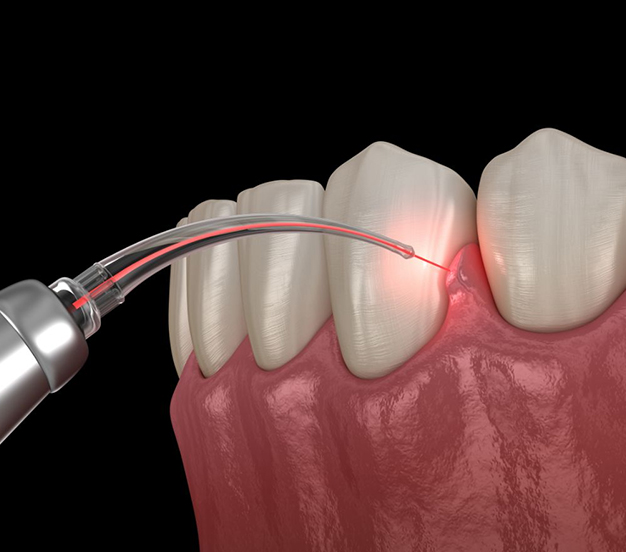
Enhancing Periodontal Treatment
Lasers are a modern way of treating periodontal disease. Controlled studies have shown that including lasers with the traditional cleanings can be used as an early intervention for gum disease and can enhance the overall health of gum tissues and can slow the progression of gum disease as compared to traditional scaling and root planing alone. While nothing will replace manual removal of plaque and tartar, laser gum therapy assists in decontaminating the gum pocket and eliminates bacterial colonies too small to be removed by traditional cleaning instruments. By using laser light energy, we can treat the diseased gum tissues and can drastically reduce the number of harmful bacteria that compromise our gum and oral health from billions to hundreds in matter of just seconds. This modern technology paired with traditional cleanings is the best way to ensure your radiant smile stays healthy.
Dental Lasers
Thanks to laser technology, advanced periodontitis can now be effectively treated without the need for surgery. Dental lasers provide a non-invasive solution by removing damaged tissue and enhancing gum health. Unlike traditional methods, laser gum therapy eliminates the need for incisions or stitches, resulting in less pain after the procedure and a faster recovery period. These specialized lasers are capable of targeting both hard and soft tissues in the mouth, making them highly versatile tools for a range of dental procedures.
Other uses for dental lasers
Our doctors at Larwin Square Dentistry possesses exceptional expertise in the use of dental lasers for periodontal treatment. Furthermore, he has undergone extensive advanced training in this field, guaranteeing our patients receive the highest quality care.
- Excess tissue at the back of the mouth is removed to eliminate snoring and obstructive sleep apnea.
- Oral lesions can be swiftly and efficiently eliminated using this method.
- This product is specifically designed for effectively cleaning and removing infection from teeth during root canals.
- Certain steps must be taken to ensure a patient is ready for dental implants.